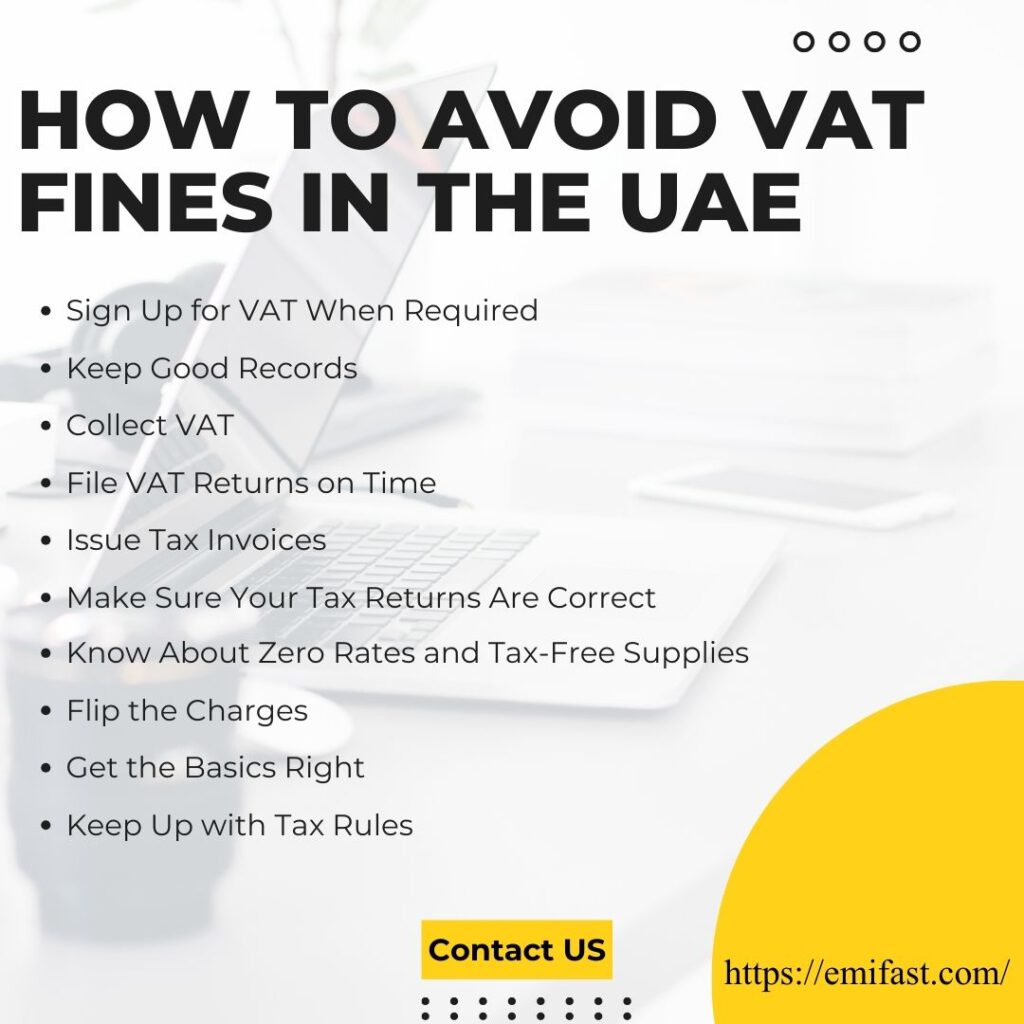Since kicking off, VAT has become a major revenue generator in the UAE. Companies must
register for VAT and submit their filings on time – it’s a matter of legality, not just smart.
Overlooking the regulations can lead to hefty penalties making it essential to have seasoned VAT
specialists to navigate the complex guidelines and ensure legal compliance.
In this post, we’ll explore the various aspects of VAT fines and penalties in the UAE when they
apply, and most how you can avoid them (also read more about VAT Services in Dubai)
Why VAT Was Introduced
In the UAE, VAT gets charged on most items and services except for a couple of exclusions. A
standard 5% VAT rate applies, but some goods are either untaxed or taxed at zero percent. The
group in charge, the Federal Tax Authority (FTA), makes sure businesses stick to the VAT
guidelines and penalizes any rule-breakers.
If your business deals in taxable products or offerings and pulls in more than AED 375,000 in
annual sales, you’ve got to register for VAT within a 30-day window. Though, if your earnings
are less than AED 375,000 but more than AED 187,500, registering is a choice you have.
The VAT system aims to get rid of double taxation and the domino effect of the old sales tax
setup. VAT kicks in at each step of making stuff, which leads to better rule-following and fewer
ways to cheat the system.
Overview of VAT Penalties
The FTA slaps huge fines on VAT rule breakers. You might get hit with at least AED 1,000 or,
for bad cases up to AED 50,000 depending on how major your slip-up is. And if you’re trying to
dodge taxes brace yourself; you could end up behind bars.
The FTA can give out fines for many reasons, like not signing up for VAT or missed VAT
return in the UAE. They also check businesses and can give out more fines if they find wrong
info or kept records.
Other typical penalties include fines for paying late making incorrect voluntary disclosures, and
adding extra charges to taxes not paid on time. In the worst cases, the FTA might stop a business
from operating or take away its license until it follows VAT laws.
How VAT Rules Benefit Taxpayers
The rules push taxpayers to speak up and fix any VAT compliance problems right away.
Companies that own up to mistakes before the FTA contacts them can get lower fines and
penalties.
For errors in old returns, businesses might even avoid fines altogether. This gives companies a
chance to sort out compliance issues before the FTA takes action.
Coming clean can also cut down on the costs of tax probes and fights. By dealing with errors
head-on, businesses can steer clear of long investigations and possible court battles lowering
risks and potential penalties.
Consequences for Non-Compliance
The FTA doesn’t mess around with businesses that break VAT rules. They hand out penalties
ranging from fines to cutting off services or even dragging people to court. If you don’t follow
the rules, you might face anything from a warning letter to criminal charges, based on how
serious and how long you’ve been breaking the law.
Some common penalties you might see:
- Fines for filing VAT late
- Fines for paying VAT late
- Punishments for VAT returns with mistakes
- Punishments for voluntary disclosures with errors
If a business hasn’t followed VAT rules, it needs to come clean to the FTA. This means telling
the FTA about the mistake and showing how they plan to fix it. Doing this might help reduce or
avoid penalties altogether.
How to Avoid VAT Fines in the UAE

1. Sign Up for VAT When Required
Businesses in the UAE making taxable sales need to register for VAT if their taxable revenue
exceeds AED 375,000. Failing to register when required can result in a AED 10,000 penalty. To
avoid fines, it’s crucial to sign up as soon as you meet the criteria.
2. Keep Good Records
Keeping detailed notes of all your business deals is vital, not just to avoid fines but also for tax
checks and VAT reports. The FTA wants businesses to keep all their transaction records up to
date. If you don’t do this, you might have to pay fines of AED 10,000 for the first time and AED
20,000 for times after that.
3. Collect VAT
As a business, you have to collect VAT for the government on all taxable supplies.
3. File VAT Returns on Time
Companies that make over AED 150 million a year must file VAT returns every month. Those
making less file every three months. Fine for missed VAT return in UAE can lead to a AED
1,000 penalty for the first time and AED 2,000 for doing it again within 24 months.
4. Issue Tax Invoices
People who pay taxes need to provide a tax invoice when they make a taxable supply. If they
don’t, they might have to shell out a AED 2,500 fine. Using software to create invoices can help
get them out .
5. Make Sure Your Tax Returns Are Correct
If you mess up your tax returns, you’ll have to pay AED 1,000 for the first error and AED 2,000
for the second one.
6. Know About Zero Rates and Tax-Free Supplies
Some companies in key sectors don’t have to pay tax. Zero-rated suppliers still count as taxable,
but their VAT rate is zero percent.
7. Flip the Charges
Flip the charges applies to stuff bought from outside the GCC. These charges stand for the VAT
you’d pay if you bought the goods or services in the UAE.
8. Get the Basics Right
A business has to send a tax invoice within 14 days after supplying goods or services. This
invoice must show the supplier’s name, address, and Tax Registration Number (TRN).
9. Keep Up with Tax Rules
It’s crucial to keep track of UAE VAT Law and any changes. Business owners and their staff
should know the newest rules to make sure they follow them. Tax experts can help you stay on
top of any shifts in tax laws.
10. Hire a VAT Consultant
Doing your VAT paperwork can be tricky and needs you to keep good track of your records and
bills. VAT experts can help you follow UAE’s VAT rules keeping you in line with the law and
lowering the chance of getting fined.
At Emifast, our team of certified tax agents and VAT experts know how to handle VAT. We can
help cut down or even get rid of VAT fines in UAE and penalties when possible. Our years of
know-how and happy clients will put your mind at ease when it comes to VAT. Get in touch
with us today and let us help your business grow without VAT fine worries




